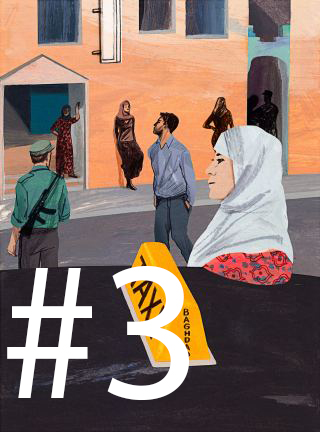In Iraq the extreme views regarding women enslaved in the sex trade share a confluence of violence. Those religious zealots who view prostitution and pimping as moral infractions, murder whole brothels. And those who run the trade also use extreme violence to kidnap and force the women into a life prostitution. This week, The New Yorker brings us a powerful first-hand account of how a country once at the forefront of women’s rights for the region is now a bastion of dangerous situations and hopeless outcomes for it’s female residents. The US’s efforts to encourage protections for women in the Iraqi constitution are all but jokes now, with new bills since introduced that would allow men to marry girls as young as nine years old and engage in nonconsentual sex or others that say a man doesn’t need to financially support his wife if is she is too old or young to satisfy him sexually.
We hear how one woman is trying to help.
The work is extremely dangerous. The pimps whom Layla encounters are women, but behind them is a tangled hierarchy of armed men: corrupt police, militias that profit from the sex trade, and militias that brutally oppose it. On the morning of July 13, 2014, the bullet-ridden bodies of twenty-eight women and five men were retrieved from two apartments, said to be brothels, in a building complex in Zayouna, a neighborhood in eastern Baghdad. I saw the bodies a few hours later, at the city morgue, laid out on the floor. Morgue workers blamed the religious militias, singling out the pro-Iranian Asa’ib Ahl al-Haq, one of the many armed outfits proliferating in Iraq. Other groups of suspected prostitutes have been found shot dead, but the Zayouna incident was the largest killing in recent years, and it prompted at least fifteen neighborhood pimps whom Layla knew to flee with their girls to Iraqi Kurdistan. Layla often visits apartments like the ones in Zayouna, posing as a retired pimp. As a cover, she sells the madams abayas that are intricately embroidered with colored crystals and diamantés; they serve to identify women as pimps, rather than prostitutes, at night clubs.
As we drew near the cinder-block shack, Layla leaned out of the window and waved. “Darling!” she shouted, then turned to Mohammad and whispered, “Be careful what you say.” The taxi came to a stop, Layla got out, and the two women greeted each other warmly. Layla had known this woman since before the invasion, when they’d both been prostitutes working and living in the area. Layla introduced me as a cousin who was briefly staying with her, and said that she was looking for another madam. The pregnant woman told her that the woman had moved her brothel, and said where. She asked Layla if she had come across a woman from Basra, in the south, named Em Ali; Layla said she knew her.
“She is doing very well with all her girls,” the woman said. “You should see the cars that come and take her girls. I sold Arwaj to her—five million dinars,” the equivalent of about forty-two hundred dollars. “Do you think that was a good price?”
“No, that was a mistake,” Layla said. “You shouldn’t have sold her. She could have been a source of regular income for you.”
Arwaj, a teen-age runaway, had been lured with the promise of safety and shelter, then held captive. The woman said that the girl had been unruly and screamed all the time.
“She was a virgin,” Layla said.
“Not anymore,” the woman replied. She had locked Arwaj in the shack with a man for three days, selling her virginity, then she sold her to Em Ali.
Mohammad offered to steal the girl back for the woman, as a ruse to find her, and asked where the brothel was. The woman didn’t know.
As we drove away in the taxi, Layla said, “This is our work. That’s how I have to talk to them to get the information I need.” She added, “If they find out what I really do, I will be killed, without any doubt, because behind every pimp are militiamen and corrupt police.” The trafficking situation was the worst it had been in recent years, she said. “Every four or five men now are calling themselves a militia. They can do whatever they want.”
Mohammad said that the country’s woes—“the theft, crime, killing, terrorism”—were all tied to the sex trade. He explained the mind-set of the men involved: “If I get used to this life style, I need to drink, to pay for girls, for rooms, for tips, for trips. That costs money, and I’ll do whatever I need to get paid.”
Iraq was once at the forefront of women’s rights in the Middle East. In 1959, the country passed Law No. 188, also known as the Personal Status Law, which restricted polygamy, outlawed child marriage and forced marriages, and improved women’s rights in divorce, child custody, and inheritance. Equal rights were enshrined in the Baath-drafted 1970 constitution, and women’s literacy rates, education, and participation in the workforce were all actively promoted through generous welfare policies, such as free childcare. That momentum was reversed by successive wars—with Iran, from 1980 to 1988, and then the 1990 Gulf War and thirteen subsequent years of international economic sanctions. Female civil servants lost their jobs in disproportionate numbers, and welfare was slashed. As part of Saddam Hussein’s “faith campaign,” which began in the early nineteen-nineties, women accused of prostitution were beheaded, according to Amnesty International. Crimes against women only increased in the chaos that ensued after the U.S.-led invasion.
In 2005, Iraq’s new constitution mandated that a quarter of the members of parliament be women, but Saddam’s fall brought to power conservative religious clerics and parliamentarians who favored laws that would give clerics more control over personal matters. In October of 2013, Hassan al-Shammari, the Justice Minister and a member of the Islamist Fadhila (Virtue) Party, introduced a bill that contained two hundred and fifty-four articles based on the Jaafari school of Shiite religious jurisprudence. The bill, which would apply to Iraq’s Shiite majority, proposed legalizing marriage for girls as young as nine, entitling a husband to nonconsensual sex with his wife, and preventing a woman from leaving her home without her husband’s permission. Article 126 stated that a husband was not required to financially support his wife if she was either too young or too old to sexually satisfy him.
Despite strong opposition from rights groups and a few clerics, the bill was approved by the Council of Ministers in February of 2014 and forwarded to parliament, which failed to vote on it before a new house was ushered in, in April. The Fadhila Party’s spiritual leader, Mohammad Yaqoobi, a white-turbaned, white-bearded marja, or religious authority, described women who opposed the bill as outcasts. The real blame, he said, lay with clerics who, in encouraging these women, were “opening the door of evil.” Mohammad Jawad al-Khalisi, another marja, told me in his office in the Shiite Baghdad suburb of Kadhimiya that men like Yaqoobi were ignorant and “do not understand their religion.”
Hanaa Edwar, a prominent women’s-rights advocate, said that the Jaafari bill made a mockery of the 2005 constitution. Edwar, a diminutive woman with a gray pixie haircut, co-founded several organizations that address women’s rights, including Al-Amal Association, in 1992. “If you don’t have power to decide matters related to your children or your pregnancy, how can you contribute to decision-making in your nation, on its future?” she said. The bill “considered women as just sexual tools for men, for their pleasure.” The draft law remains dormant, but Edwar described it as “a time bomb.”
The lawlessness overtaking Iraq poses a more immediate threat to the nation’s women and girls, especially those without the support of their families. Since June, 2014, the Islamic State has seized much of the country’s northwest, including the cities of Mosul, Ramadi, and Fallujah. The Sunni extremists have beheaded their male enemies and sexually enslaved some female captives, including several thousand women and girls from the Kurdish-speaking Yazidi minority, in northern Iraq. In the October, 2014, issue of Dabiq, the Islamic State’s English-language magazine, the group boasted that “the enslaved Yazidi families are now sold by the Islamic State soldiers.”
New militias have sprung up to counter the Sunni extremists, and existing ones have expanded. Human Rights Watch, following its 2015 World Report, accused some Shiite militias of engaging in “unfettered abuses against civilians,” including summary executions, torture, and the forced displacement of thousands from their homes. After twelve years of conflict, there are more than three and a half million internally displaced Iraqis, as many as two million war widows, and a million or more orphans. The U.S. State Department noted, in its 2015 “Trafficking in Persons” report, that the vulnerability of women and children to trafficking had “gravely increased” in the past year, and that security and law-enforcement officials, as well as criminal gangs, were involved in sexual slavery.
“I never imagined that we would reach this level of chaos, this degree of complete disintegration of the state,” Edwar told me. “You don’t see that there is rule of law, that there are national institutions. You just see militias, gangsters. There is no respect for diversity, for human rights in this country.”
In 2004, Iraq created a State Ministry for Women’s Affairs, but it was largely a ceremonial body. An engineer named Bayan Nouri assumed the post of minister in October of 2014. When I met Nouri in May, she was working on the eleventh floor of a parliamentary office building, in Baghdad’s International Zone. A soft-spoken woman in her fifties, she wore a long, belted overcoat and a hijab that was pinned under her neck. She said that, if it weren’t for the current war against the Islamic State, the situation for Iraqi women would be “better, over all, than before 2003.” Nouri expressed concern about the Islamic State’s kidnapping of the Yazidis, but she dismissed the claim that sexual violence was increasing: “They say it is present, but this isn’t obvious, it’s limited. It existed during Saddam’s time, too, but the media doesn’t talk about that.”
Nouri’s ministry had twenty employees, who helped to map out policies, programs, and strategies for other ministries to implement, but it had no budget. “Obviously, if we don’t have money or the authority to implement things, it’s catastrophic, it’s a challenge ahead of us,” Nouri said. She and her three predecessors had asked the cabinet and parliament to upgrade the status of the ministry in order to secure a budget. Instead, in August, as part of a government downsizing, the ministry was abolished, along with the Human Rights Ministry, and several others were merged. A former ministry spokesperson told me that Nouri has retired from politics.






